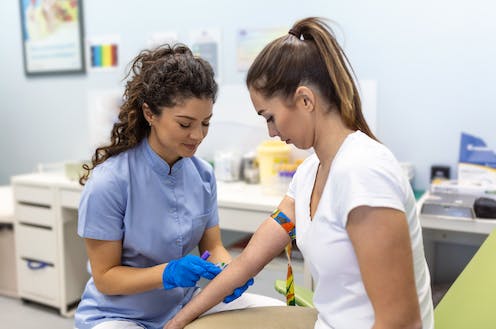
In 2013, actress Angelina Jolie wrote an op-ed where she revealed she’d undergone a double mastectomy. Although Jolie didn’t have breast cancer, a genetic test had revealed she carried a genetic mutation that her doctors said put her at an 87% risk of developing breast cancer in her lifetime. Jolie also had a family history of breast cancer, losing her mother, grandmother and aunt to the disease.
Jolie has a genetic mutation to one of her BRCA genes – specifically the BRCA1 gene. We all have BRCA genes, which function as tumour suppressors. These genes are essential for healthy cell survival and cancer prevention. They act to repair our DNA and fix errors that occur due to ageing or environmental exposures (such as tobacco or radiation).
When there’s a defect in these genes, they don’t function as they should. This leaves people at higher risk of developing breast cancer. According to previous research, mutations in the BRCA1 gene carry an estimated 65-80% lifetime risk of developing breast cancer, while mutations in the BRCA2 gene carry a 45-85% risk of breast cancer.
What followed the publication of Jolie’s testimonial has been dubbed “The Jolie Effect” – a sharp rise in the number of women worldwide undergoing genetic testing and having preventative mastectomies to reduce their risk of breast cancer if they are found to have the BRCA genetic mutation. This increased access to testing has resulted in greater detection of BRCA mutations and has undoubtedly led to life-saving preventative care for many.
But a recent study from researchers at the University of Exeter has questioned how useful these tests may be after showing that breast cancer risk from BRCA mutations may not always be as high as once thought.
BRCA gene
To conduct their study, investigators looked at a total of 454,712 participants aged 40-69 from the UK Biobank study (a large-scale health study containing genetic and medical information from half a million UK residents). They identified participants with a BRCA gene mutation, then used the database to ask if they had a family history of breast cancer.
Then, using cancer registry data collected as part of the UK Biobank study, the researchers calculated a person’s risk of developing breast cancer if they had a BRCA gene mutation – both with and without a known family history of breast cancer.

Tinseltown/ Shutterstock
The investigators found that while all participants with BRCA gene mutations carried a greater risk of developing breast cancer compared to the general population, this risk was 1.5-1.9 times higher for those with a family history of the disease.
The study also found that risk of breast cancer from the BRCA gene was not as high as previously thought in people without a family history of the disease. Women who only carried the BRCA1 gene variant had a 23% greater risk of developing breast cancer by age 60, while those with the BRCA2 variant had an approximately 18% risk of developing breast cancer before 60. But in women who’d had a close relative develop breast cancer, the BRCA1 variant carried a 45% greater risk of developing the disease before age 60. The BRCA2 variant carried a 24% greater risk.
While this is a significant study with a large number of participants, the relative risk values were generated for cancer diagnosis before the age of 60. Usually, lifetime risk is calculated up to the age of 75. This means we are limited with regard to understanding risk in older people who have these gene mutations.
Genetic testing
Being able to access genetic testing is important as it allows each person to better understand their health and make decisions about treatments that will most benefit them. But the choice to undergo risk reduction surgery as a result of genetic testing is not an easy one to make. This study highlights the importance of speaking with your doctor when interpreting the results of these tests before making any decisions.
This study has shown just how important it is to take family history into account when deciding whether or not to have preventative surgery. People with a BRCA1 or BRCA2 gene mutation who have had a close family member develop breast cancer (such as a parent or sibling) may see the greatest benefit from having preventative surgery. Those who do not have a family history of breast cancer may want to talk to their doctor and discuss their risk of developing breast cancer, alongside strategies for monitoring their health into the future.
![]()
The authors do not work for, consult, own shares in or receive funding from any company or organization that would benefit from this article, and have disclosed no relevant affiliations beyond their academic appointment.























